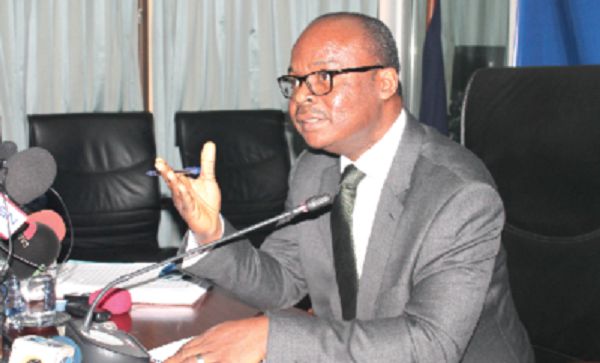
You caused it! -Dr Addison accuses predecessors of bank failures
For the first time since leading the team to revoke the licences of seven banks in 12 months, the Governor of the Bank of Ghana (BoG), Dr Ernest Addison, has openly taken a swipe at his “predecessors” for failing to take decisive actions when necessary and rather virtually nurturing illiquid and insolvent banks that later cost the state GH¢12.7 billion to resolve.
In a 17-page speech that aimed to distance the current leadership of the central bank and the government from the challenges that prompted the bank closures, Dr Addison also chastised “our detractors” for impugning that the bank closures were to victimise wholly owned Ghanaian entities.
Advertisement
He told a packed hall of bankers at the 2018 annual bankers’ dinner on December 1: “We inherited a financial system which was under a considerable state of distress, with banks that were
not meeting capital adequacy requirement, banks that had suffered capital erosion with high non-performing loans, which had led to a weak transmission of monetary policy to the real economy.
“Some of these banks were insolvent and illiquid, others were solvent but illiquid.
“Our predecessors continued to provide liquidity support to these weak failing banks without addressing the underlying problems that led to the illiquidity and insolvency of these institutions.
“In short, the financial system had reached a tipping point and we could not just have assumed business as usual,” he said.
“The cleaning up objective was to ensure the orderly exit of insolvent banks from the industry with the view that any bank licensed and regulated by BoG is guaranteed to access your deposits when you need them and not to victimise wholly owned Ghanaian entities as our detractors sought to impugn.”
Job savings
Addressing the gathering as the guest speaker, the governor placed the blame of the bank closures squarely on past leadership of BoG, who he said failed to address “the underlying problems that led to the illiquidity and insolvency of these institutions”.
Beyond justifying BoG’s actions and chastising predecessors and detractors, his speech also enumerated the lessons learnt and the reforms adopted and hinted of further actions and policies in the coming year.
Dr Addison explained that the revocations of the licences were meant to ensure an orderly exit of insolvent banks to help protect depositors and mitigate the contagion on the entire financial sector.
He said thanks to BoG’s decisive interventions (first in August 2017 and later in August this year), GH¢10 billion of deposits belonging to 1.5 million depositors were saved.
“Additionally, the orderly intervention and revocation of these licences and the purchase and assumption transactions that ensued minimised the potential adverse impacts by ensuring that about 70 per cent of the 5,000 jobs in the affected banks were saved.
“This would be contrasted to what could have been the imploding of these banks and the contagion that could have resulted,” Dr Addison said at the event organised by Chartered Institute of Bankers (Ghana).
Dr Wampah
Dr Addison replaced Dr Abdul Nashir Issahaku, who resigned on April 1, 2017 – four months after the New Patriotic Party (NPP) took office and one year into his four-year contract with the central bank.
Dr Issahaku had earlier replaced Dr Henry Kofi Wampah, who also resigned in March 2016, citing the need to give his successor ample time to prepare for that year’s general election in December.
On August 14, 2017 – four months after Dr Addison took office -, BoG revoked the licences of the UT and Capital banks and subsequently approved a purchase and assumption (P&A) agreement with GCB Bank to assume ownership of selected assets and liabilities.
A year later – August 2018 – the central bank revoked the licences of five more banks – uniBank, Sovereign, BEIGE, Royal and Construction banks – after citing them for various malpractices that included falsifying documents to obtain licences.
Their selected assets and liabilities were transferred to Consolidated Bank Ghana Limited (CBG), a newly incorporated lender that was recapitalised with GH¢450 million and issued a bond of GH¢5.76 billion – both from the public purse.
Lessons
Although the central bank’s new sternness prompted public outcry and subdued confidence in the financial sector, Dr Addison insists that the reforms were aimed at addressing the legacy problems in the banking sector.
He mentioned poor corporate governance, false financial reporting, insider dealings and other practices, which he said “left some banks insolvent”.
The governor explained that the central bank had since put in place adequate measures to help prevent a repeat in the future.
He mentioned the introduction of directives on financial holding companies, corporate governance and the fit and proper persons for banks as some measures and expressed the hope that they would combine with other efforts to help strengthen the financial sector.
He added that the central bank was also working with the Ministry of Finance on a plan to resolve the pockets of distress issues in the non-bank and specialised deposit-taking institutions subsector.
The objective, he said, was “to restore trust and confidence in the entire financial system”.




